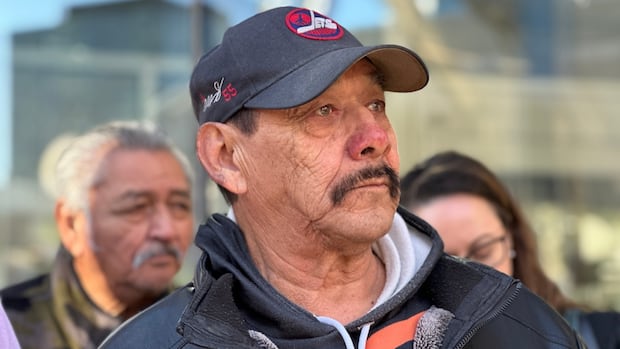First Nations man sues government over wrongful conviction in 1973 Winnipeg murder
A third First Nations man recently exonerated in the 1973 killing of a Winnipeg father has filed a lawsuit against all three levels of government, seeking damages for his wrongful conviction in a case that involved racism, police brutality, false confessions and a prosecutor linked to a number of other wrongful convictions in Manitoba.
Clarence Woodhouse, now 73, was one of four young men from Pinaymootang First Nation convicted by a jury in 1974 in the killing of Ting Fong Chan, 40, a restaurant worker and father of two found beaten and stabbed near a downtown construction site.
Woodhouse was exonerated in the case in October during a brief court appearance where Manitoba Court of King’s Bench Chief Justice Glenn Joyal declared him innocent and apologized for a case he called “infected” by systemic racism, from the investigation to the prosecution to the adjudication.
Court heard during that appearance Woodhouse had always maintained his innocence, and that the case against him and the other young men was “almost entirely” based on manufactured police confessions.
However, evidence about police practices at the time and Woodhouse’s familiarity with the English language “undermines their reliability and veracity,” Michele Jules, executive director of the Manitoba Prosecution Service, said at the time.
Woodhouse filed the statement of claim in the Court of King’s Bench on Feb. 7, naming the provincial and federal attorneys general, the province and the City of Winnipeg as defendants, in a lawsuit alleging a negligent police investigation, malicious prosecution, false arrest, police conspiracy and rights violations, including a failure to disclose relevant evidence to the defence.
Some of those claims involve Crown attorney George Dangerfield, who died in 2023 and was also the prosecutor in four other wrongful conviction cases.
The latest court filing comes almost a year after two other men wrongfully convicted in the same case filed a similar lawsuit. Allan Woodhouse (who isn’t related to Clarence Woodhouse) and Brian Anderson were also acquitted of murder in the case in July 2023.
The fourth man involved in the case — Clarence Woodhouse’s brother, Russell Woodhouse — was convicted of manslaughter and died of cancer in 2011. His case is awaiting a decision from Canada’s justice minister following a posthumous review of his manslaughter conviction.
Police didn’t investigate alibi
Woodhouse’s lawsuit says he was 21 and spoke little English when he was arrested, and describes him as a day school survivor and a “vulnerable person with a limited education.”
The lawsuit says when Woodhouse was taken into custody, police told him they had witnesses accusing him of being involved in Chan’s killing, showed him the false confessions of two of his co-accused, accused him of lying, subjected him to verbal abuse related to his Indigenous heritage and physically assaulted him.
It says at the time of Chan’s killing, Woodhouse was asleep at his home in Winnipeg — an alibi police never investigated.
“As a result of the conduct of the police officers, Clarence signed a false confession to stop the abuse. The false confession was written in fluent English even though Clarence could not speak or write in fluent English,” the lawsuit says.
Woodhouse served more than 10 years of his life sentence in prison before being granted parole with conditions, the court filing says, and while incarcerated was “subjected to racism by employees and independent contractors of Correctional Service Canada.”
The lawsuit says while the city oversees the Winnipeg Police Service and its officers, it was the province that prosecuted the case and the federal government that’s responsible for the Parole Board of Canada and prison authorities.
The lawsuit also describes Woodhouse’s treatment by police and Dangerfield, and his continued imprisonment and time on parole as an innocent person, as “cruel and unusual,” saying it “outrages society’s sense of decency.”
The court filing seeks damages on a number of grounds, including loss of liberty and reputation, pain and suffering, loss of income and opportunity to earn income and “the humiliation and disgrace associated with” being wrongfully convicted.
Spokespeople for the city and the province said via email on Tuesday there would be no comment while the lawsuit is before the courts. A spokesperson for the federal Justice Department said it’s reviewing the lawsuit “and will file a response in due course.”

